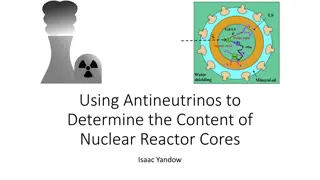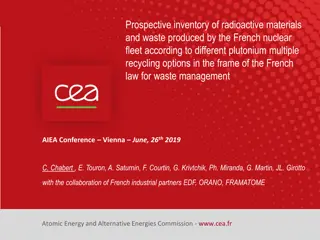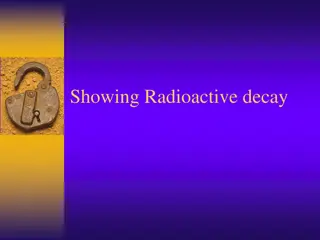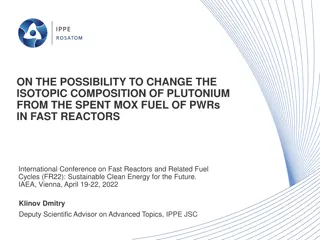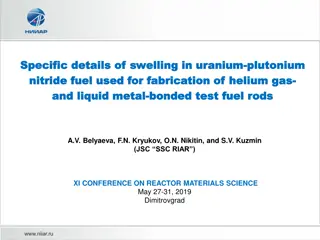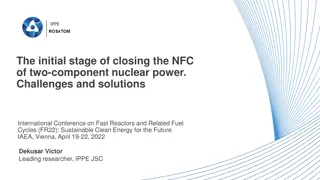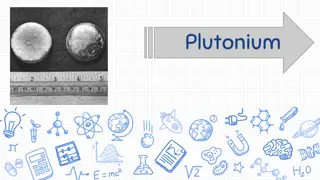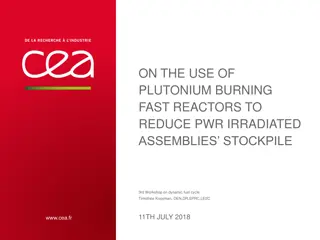Utilizing Antineutrinos for Nuclear Reactor Core Monitoring
Plutonium can be clandestinely removed from reactors for nuclear weapons, with neutrinos emitted by reactors providing insights into core contents. Neutrino detectors require high efficiency, energy resolution, and strategic placement. Although detectors meeting these criteria exist, they are not al
1 views • 8 slides
Prospective Inventory of Radioactive Materials and Waste Management Study in French Nuclear Fleet
The study conducted by the French Atomic Energy Commission in collaboration with industrial partners like EDF, Orano, and Framatome explores different plutonium recycling options in the French nuclear fleet. It assesses scenarios involving open cycle, mono-recycling, and multiple recycling of pluton
0 views • 16 slides
Radioactive Decay and Isotopes in Chemistry
Explore the fascinating world of radioactive decay, isotopes, and nuclear transformations in this educational resource. From reviewing atomic numbers to illustrating alpha and beta decay processes, discover the fundamental principles behind these phenomena with detailed explanations and visuals. Del
0 views • 17 slides
Innovations in Reprocessing Spent MOX Fuel for Sustainable Nuclear Energy
Discussion at the FR22 Conference focuses on the potential for fast reactors to modify the isotopic composition of plutonium from spent MOX fuel of PWRs. By utilizing fast reactors like BN-800, countries can alter the fissile isotopes in plutonium, enabling its reuse in thermal reactors and effectiv
0 views • 8 slides
Investigation of Swelling in Uranium-Plutonium Nitride Fuel for Helium Gas Fabrication and Liquid Metal-Bonded Test Fuel Rods
This study examines the specific details of swelling in uranium-plutonium nitride fuel used for fabrication of helium gas and liquid metal-bonded test fuel rods. Key irradiation parameters, examination techniques, and the structural and phase state of SNUP fuel after low-temperature irradiation are
0 views • 18 slides
Challenges and Solutions in Closing the NFC of Two-Component Nuclear Power
Strategic goal of transitioning Russian nuclear power plants to a two-component NES, focusing on the initial stage of closing the NFC. Scenario involves thermal neutron reactors with fuel cycle closure using BN reactors. Analysis shows the feasibility of using existing plutonium stockpiles for futur
0 views • 10 slides
Fascinating Element Plutonium
Plutonium, with atomic number 94, is a silvery-gray actinide metal known for its toxic and radioactive properties. Discovered in 1934, it has various uses, including power sources and medical applications. Its nuclear properties, such as fission reactions, have been extensively studied. Despite its
0 views • 5 slides
Plutonium Burning Fast Reactors for Reducing PWR Stockpile
Workshop presenting the utilization of plutonium burning fast reactors to decrease PWR irradiated assemblies stockpile through the CAPRA project. The performance and impact on plutonium inventory are assessed, highlighting the potential reduction and the additional reprocessing and manufacturing req
0 views • 16 slides
